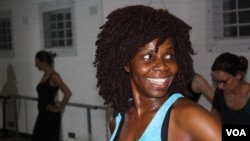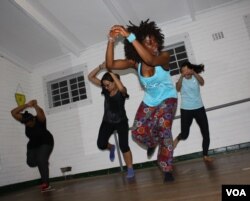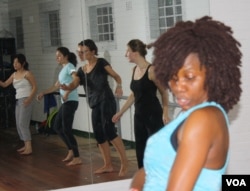An acclaimed Nigerian actress and dancer is inspiring growing numbers of people in South Africa to get up and boogie. Vera Ephraim is also an award-winning choreographer, having collaborated with a host of celebrated African musicians, including South Africa's Hugh Masekela and Nigeria's Femi Kuti. Darren Taylor has more from Johannesburg.
A lithe woman, Ephraim, clad in a turquoise vest and wide, patterned pants shouts instructions inside a studio in Johannesburg. Her thick, black curls glisten with sweat as she explains how she began her unique mission here about a year ago.
“I had a lot of encouragement from a group of friends who said, ‘Vera, you know, can you start a dance class; I really want to know what Western African dance looks like, what it sounds like; what it feels like; how is it different from southern African movement?’”
Accomplished dancer
Ephraim has university diplomas in performance art from Britain, has danced in productions across Europe and acted in some of South Africa’s top TV shows.
Now, though, she is busy with what she describes as "her greatest challenge yet": teaching complete novices the art of traditional West African dancing.
Ephraim says West African dances are very fast, driven by a particular drum beat.
“In West Africa, we use a lot of djembe drumming," she explains. "The rhythm is different also of course because djembe produces up to four, five rhythms on its own…”
Among her eager pupils is Renske van den Hof, a social policy analyst from the Netherlands. She says the djembe “frees” her and makes her feel a part of the continent.
“The drums obviously help to feel more of an African feeling; you get a more African vibe to it [the dancing]” she says.
Getting their groove on
Ephraim says West African dancers use a lot of hip movement and dance with their whole bodies. In what she calls a “harvesting dance,” her students hurl their bodies forward while their arms scrape the floor.
“If you’re harvesting, your arms are plucking the apples or your arms are digging up the yams from the soil," she explains.
Ephraim also fuses more modern African music with djembe drums to “spice things up” for her students. She explains that the dances she teaches have story lines.
“This dance is from Ghana; it’s for marriage. And this movement here signifies the girl is being shy, the girl is being shy; she’s shaking the shoulder. And then this is the guy posing like, ‘I see you; I’m coming over,' " she tells her students.
Ephraim's dancers are a diverse bunch, from domestic workers to rich businessmen to Emi Kawamura, an administrator for a Japanese car company.
“Even if we are just a beginner, even if we don’t know the technique, we can always enjoy [the dance classes]," Kawamura says.
Expats love it
Ephraim’s present classes have been filled up by a group of expatriate professionals.
For procurement manager Laura Del Castillo, from Spain, West African dancing is “fun and challenging.”
“It’s a great experience of just listening to music, and not thinking of anything else but concentrating on what step you have to do next, and just laughing about yourself and how wrong you’re doing it!” she says laughing, joined by the other students in the class.
Alejandro Campero, an economist from Mexico, says she’s learning West African dance purely because of Ephraim’s “dynamism.”
“She’s always full of good energy and has this power that not everybody [has]. She gets everybody into the mood, and that’s so nice," Campero says.
Ephraim says nothing gives her more satisfaction than watching her students grow, and connect with West African movements and stories, here in the heart of South Africa.






